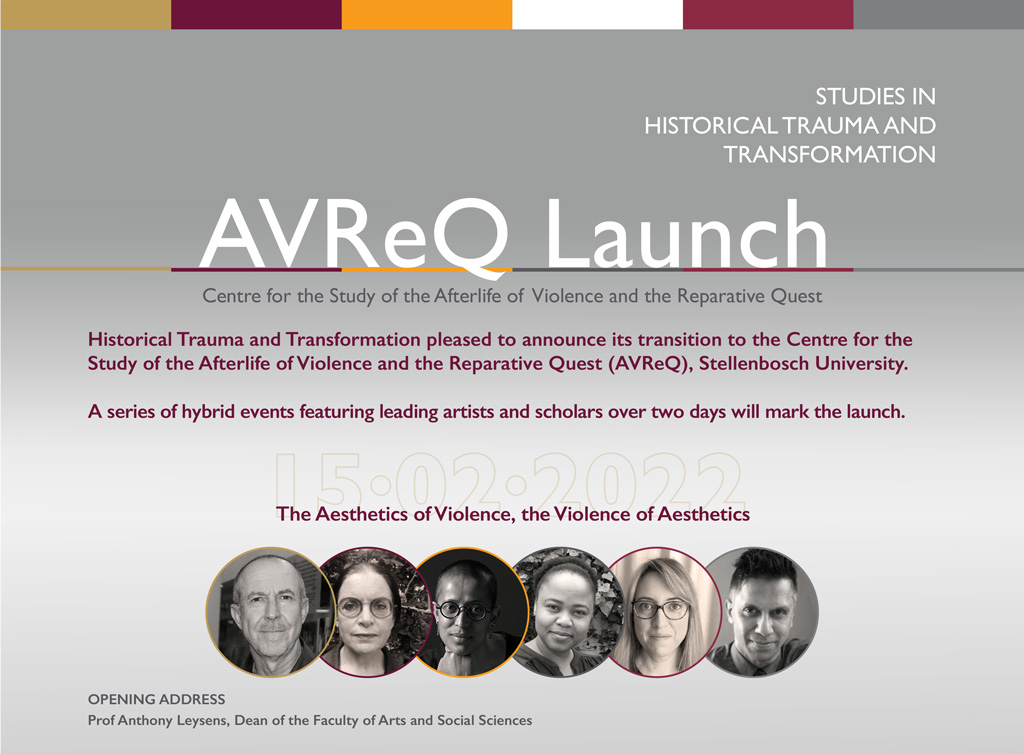Launch of the Centre for the Study of the Afterlife of Violence and the Reparative Quest (AVReQ)
Date: 15 & 16 February 2022
The hybrid event was be moderated by Prof Tamar Garb (University College London). The panel discussion spoke to the powerful potential of the aesthetic and the problematics of aestheticization. It addresses the tyranny of historical aesthetic regimes with their racialised and hierarchical assumptions, and the capacity to challenge them in artistic gestures and reparative practices.

Host: Prof. Pumla Gobodo-Madikizela
Professor Gobodo-Madikizela is the Director of the Centre for the Study of the Afterlife of Violence and the Reparative Quest (AVReQ) and holds the SARChI Chair in Violent Histories and Transgenerational Trauma. She notes that violence has a transgenerational afterlife living on long after the traumatic events are over, and leaving it imprints on individuals, communities in owning institutions affected by it. In transitioning from the Historical Trauma and Transformation to AVReQ, Prof Gobodo-Madikizela highlights the importance of contributions that enable and set agendas that create dialogue for issues about violence, traumatic transgenerational repercussions, and the possibility of repair. The launch of AVReQ is thus representative of the ongoing conversation with collaborators engaging with the problem of the enduring impact of violence histories in which the arts are regarded as a critical arena for thinking through the relationship between violence, its afterlife in identities and temporality.
Professor Anthony Leysens
In his opening remarks the Dean of the Faculty of Arts and Social Sciences, Professor Leysens lauds AVReQ’s research focus as one that deals with the most vexing questions and challenges which is faced and continues to face our society, with all its various forms. The issue of violence, but also the question of its reparations. Prof notes that in addition to understanding of the complexities of the past, which is absolutely essential, AVReQ focuses on the present and the future of interventions while dealing with questions of how we break the cycle of repetition, the passing on of intergenerational trauma and crucially, bring about healing and restoration, which has resulted from the legacies of violent pasts. Prof Leyens foresees that the AVReQ Centre will become an international hub for a search and teaching because of their interdisciplinary approach.
Profile: http://www.sun.ac.za/english/faculty/arts/political-science/Pages/Staff/anthony-leysens.aspx
Opening remarks of the Centre for the Study of the Afterlife of Violence and the Reparative Quest (AVReQ)
“Aesthetics of Violence: The Violence of Aesthetics”
Moderated by Prof Tamar Garb
To launch AVReQ Centre, Professor Tamar Garb moderated a panel discussion by posing several questions as a process of dealing with some difficult questions in putting ascetic at the heart of our concern. Questions about the mutual implication of aesthetics and violence, how aesthetics puts pressure on the question of violence. Whether there is an aesthetics of violence. Whether the aesthetics itself can bring with it violence.
Profile: https://www.ucl.ac.uk/art-history/people/academic-staff/professor-tamar-garb
Panellists/Speakers at the launch
Prof. Jay Pather
Title: Aesthetics of Violence: The Violence of Aesthetics
Professor Pather shared some thoughts on historical aesthetic machines in the handling of violence and attempts by artists to challenge this in their work. Prof Pather reflected on the most evocative interventions calling back the mourning of identity to the use of space and proximal relations in the performance of sculptures of artists, buildings, and space. Works that challenge spatial violence, like the temporal and embodied disavow roles of prescriptive narratives.
Profile: http://www.gipca.uct.ac.za/jay-pather/
Prof. Stella Viljoen
Title: The Joke’s on You! The Slow violence of ridicule in SCOPE Magazine (1976)
Professor Viljoen reflected on SCOPE, a men’s magazine started in 1966, as an example of the violence in popular media to see if the assertions of racial erasure that were made about whites are still applicable. In addition to racial erasure, by zooming in on an article called, “Drumming up jungle jumble”, Prof Viljoen asserts that by implication, the shoot prevents representational, which is to say, aesthetic accountability and reciprocity. The representation implies a pernicious ignorance of those that pretends to represent and refuses them the right to look the possibility of an oppositional gaze, refuses them the possibility of sharing in the ‘joke’ those with historical advantage, like the white readers of scope seek.
Profile: https://stias.ac.za/fellows/stella-viljoen/
Prof. Nomusa Makhubu
Professor Nomusa Makhubu reflected on the notion of aesthetic and violence questioning the relationship between violence and the beautiful. Making the argument that it’s not always easy to see and to make sense of how systemic violence manifests, nor is it always visible nor explicit, since it is interwoven in all of that is commonplace. Prof Makhubu uses the work of Langiswa Gqunta to talk about the ability to make the hidden and quotidian violence visible/palpable, leading to the question of the necessity of violence, i.e., when is violence necessary, when is it justifiable?
Profile: http://www.michaelis.uct.ac.za/fin/people/academic-staff/nomusa-makhubu
Gabrielle Goliath
Grabrielle Goliath highlights how the present-day conditions of black feminine life are bound to historical formations of imperial and colonial power, placing it in proximate relation to racial, sexual violence paradigm that governs and organizes the social world. Grabrielle reflects on the story of Berenice, a name spoken over her, never to her, never to be hers and yet hers. A name born to be part of her heart and to be shared. In addition, Grabrielle draws on the performance of the Cape Town University choir, their sound of lament that is not a song but an internally generated hum, for Uyinene Mrwetyana, a 19-year-old student who was raped, tortured, and bludgeoned to death